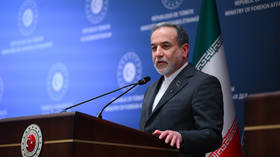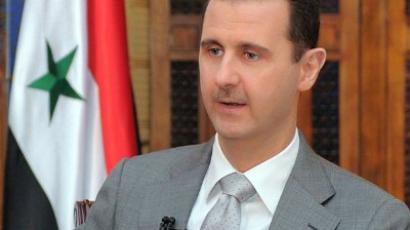‘Syria solution: Federation without Assad’
The Western plan to dismantle Syria would mean a terrible civil war, so Bashar Assad should sacrifice his presidency to protect the country from splitting up, believes Professor Johan Galtung, rector of the Transcend Peace University in Switzerland.
Redesigning the region and rewriting its map – that is the Western agenda in the Middle East, insists Galtung, specifying that “above all of that – protection of expansionist Israel.”“It is difficult to tell what the line up really is, but everything is set toward a major civil war, which could be terrible, with NATO siding with one of the parties, so the long-term consequences would be much worse,” he said.“The Western intent is a complete split of Syria from the Iranian connection,” Johan Galtung claimed.“Quite obviously what should happen would be for [President Bashar] Assad to step down and some sort of a coalition government to be formed,” said the professor, adding that Syria needs decentralization.“Not splitting into four or five countries, which would be what the Western powers want, but in other words a decentralized federation,” he argued.The professor speculated that in case of foreign interference in Syria, “In the beginning NATO will win and then the real war starts, like it probably will in Libya and like it is probably envisaged for Syria.”“I do not think that that is a solution at all,” he emphasized.The so-called Free Syrian Army is openly fighting against government troops, but it has been said that international community chooses to ignore armed militia groups operating in Syria, agreed the professor.Johan Galtung believes the reason Western media focuses so much on the problematic situation in Syria and totally ignores the similar state of Bahrain is “which group the big Western boys are siding with” – in Syria they support the opposition while in Bahrain they support the regime in power.Professor Galtung called on to the international community to send 1,000 mediators in to Syria to talk to all the parties and trying to get them together and “trying to persuade Assad to dedicate himself to his profession as a doctor.”Syria is an artificial country and it has problems typical of a former Western colony, he said.“In such countries you have endless amount of frontlines and contradictions,” explained Galtung, naming, among others, Muslim Sunni and Shiah, Kurds and Arabs, and the Alawi related to Sunni and Christians.“The minorities [in Syria] are very much afraid of a Sunni [armed opposition] victory. The Alawis, i.e. Shia, have hailed a kind of protective hand over them,” he said.The UN call for urgent action to protect civilians in Syria echoes the Libyan scenario, shared Galtung. “We’ve heard that tune before.”The UN Human Rights Council has passed a resolution condemning “gross violations” in Syria. The decision is based on a recent report detailing abuses during the government crackdown on protesters and urges the broader UN to take appropriate action.A special investigator has also been appointed to monitor how the government copes with the unrest in the country.Russia and China were among those who voted against the resolution. Moscow says the UN report which led to the vote, was not fully objective and the international community is hearing only biased accounts of what is happening in the country.It is quite relevant that the UN Human Rights Council's resolution could provide an incentive for the UN Security Council to respond, but Johan Galtung doubted that they will succeed.The Russian naval base in Syria’s port of Tartus also affects the situation and on top of that – the play of China, which is siding with Iran as its primary source of oil, Galtung added. All these factors make the Syrian stalemate solvable only through negotiations, he said.














